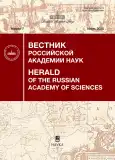Concept for solving the problem of polymer waste and cleaning the world ocean
- Authors: Chvalun S.N.1, Shcherbina M.A.1, Bystrova A.V.1, Muzafarov A.M.1
-
Affiliations:
- Enikolopov Institute of Synthetic Polymer Materials, Russian Academy of Sciences
- Issue: No 7 (2025)
- Pages: 14-22
- Section: НАУКА И ОБЩЕСТВО
- URL: https://journal-vniispk.ru/0869-5873/article/view/305214
- DOI: https://doi.org/10.7868/S3034520025070029
- EDN: https://elibrary.ru/fhrkba
- ID: 305214
Cite item
Abstract
Plastic pollution of the World ocean is a pressing problem of the international level. According to the most conservative estimates, millions of tons of plastic are dumped into the ocean every year, and the area of the Great Pacific Patch is 1.5 million square kilometers. Unfortunately, today the international community is being forced to adopt approaches to solving this problem that have no serious scientific basis and are deeply contradictory in their basis. The essence of the measures proposed by developed countries is to fix the current state of affairs, in which a small circle of countries has developed industry and technology (including the production of a wide range of polymeric materials), while for the rest of the world such development is artificially restrained for environmental reasons. The only way out of this situation was the development of a systemic, sovereign concept of the Russian Academy of Sciences aimed at solving the problem of polymer waste, and its further promotion both on the territory of our country and jointly with interested countries. The developed Concept assumes solving the problem of polymer waste using nature-like methods and technologies, choosing the most economical and safe of them. It is the result of a broad discussion in the professional community of specialists in the field of polymer materials science and ecology.
About the authors
S. N. Chvalun
Enikolopov Institute of Synthetic Polymer Materials, Russian Academy of Sciences
Author for correspondence.
Email: serge@ispm.ru
Moscow, Russia
M. A. Shcherbina
Enikolopov Institute of Synthetic Polymer Materials, Russian Academy of Sciences
Email: max-shcherbina@yandex.ru
Moscow, Russia
A. V. Bystrova
Enikolopov Institute of Synthetic Polymer Materials, Russian Academy of Sciences
Email: bystrova@ispm.ru
Moscow, Russia
A. M. Muzafarov
Enikolopov Institute of Synthetic Polymer Materials, Russian Academy of Sciences
Email: aziz@ispm.ru
Moscow, Russia
References
- An introduction to plastic recycling // Plastic Waste Management Institute, 2022.
- Общая биология: Учебное пособие для 11-го класса. § 45. Биосфера и её структура. М.: Просвещение, 2022. General Biology: Textbook for the 11th grade. § 45. The biosphere and its structure. Moscow: Education, 2022. (In Russ.)
- Geyer R., Jambeck J.R., Lavender K. Production, use, and fate of all plastics ever made // Science Advances. 2017, vol. 3, no. 7, e1700782. doi: 10.1126/sciadv.1700782
- https://www.rbc.ru/business/26/03/2021/605c50f79a794729fde26282
- Kishanov K. et al. Recent Developments and Perspectives of Recycled Poly(ethylene terephthalate)-Based Membranes: a Review // Membranes. 2022, vol. 12, no. 12 (11), p. 1105. https://doi.org/10.3390/membranes12111105
- Ла Мантия Ф. Вторичная переработка пластмасс. СПб.: Профессия, 2006. La Mantia F. Recycling of plastics. St. Petersburg: Profession, 2006.
- Werner M. et al. Closing the Plastics Circularity Gap Full Report. 2022. Google/AFARA Report
- Garcia-Gutierrez P., Amadei A.M., Klenert D. et al. Environmental and economic assessment of plastic waste recycling A comparison of mechanical, physical, chemical recycling and energy recovery of plastic waste, Publications Office of the European Union, Luxembourg, 2023. doi: 10.2760/0472, JRC132067.
- IHS Markit. The IHS Markit View of the Energy Future for Rivalry, Autonomy, and Discord (2020–2050). 2020.
- Carducci N., Hoglund A., Lube M., Murdock D. Mixed Plastic Recycling Plant. 2020.
- Faraca G., Martinez-Sanchez V., Astrup T.F. (2019). Environmental life cycle cost assessment: Recycling of hard plastic waste collected at Danish recycling centres // Resources, Conservation and Recycling. 2019, no. 143, pp. 299–309.
- Chemical Recycling of Plastic Packaging Materials – Analysis and opportunities for upscaling. Netherlands Institute for Sustainable Packaging (KIDV), 2018.
- Stapf D., Wexler M., Seifert H. Thermal Processes for Feedstock Recycling of Plastics Waste // Report to BKV and PlasticsEurope. 2018, november, pp. 1–68.
- https://www.unep.org/ru/globalnaya-obyazatelstvo-novaya-ekonomika-plastmass
- https://emf.thirdlight.com/file/24/K6LOnIrK6TiV5CaK63uPKX6taWr/The%20Global%20Commitment%202023%20Progress%20Report.pdf
- Российский экологический оператор. https:// green.reo.ru/howto/tpost/bmsccy5dr1-modnii- bumazhnii-ili-grustnii-plastikovi Russian environmental operator. https://green.reo.ru/howto/tpost/bmsccy5dr1-modnii-bumazhnii-ili-grustnii-plastikovi (In Russ.)
- Информационно-технический справочник по наилучшим доступным технологиям ИТС 5-2022 “Производство стекла” (утв. приказом Федерального агентства по техническому регулированию и метрологии от 13 декабря 2022 г. № 3159). https://base.garant.ru/406092259/1cafb24d049dcd1e7707a22d98e9858f/
- https://www.carbonfootprint.com/calculator.aspx
- https://www.un.org/sustainabledevelopment/ru/sustainable-development-goals/
- https://cascale.org/
Supplementary files

Note
In the print version, the article was published under the DOI: 10.31857/S0869587325070022









